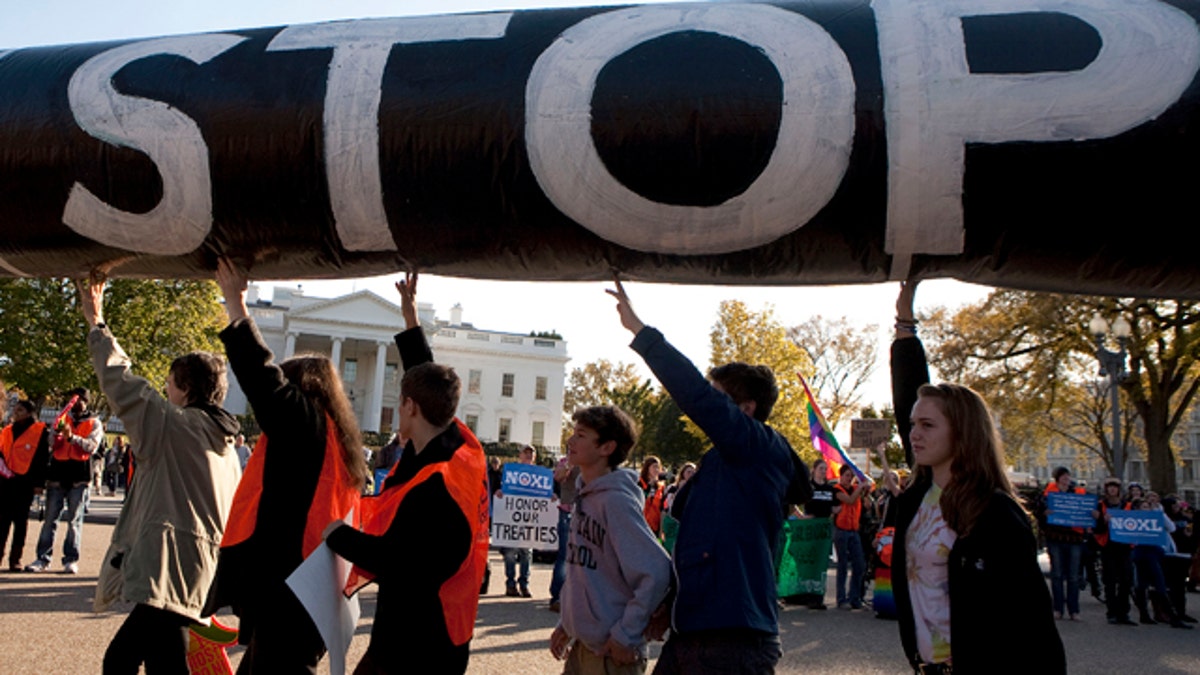
FILE: Nov. 6, 2011: Demonstrators call for the cancellation of the Keystone XL pipeline a rally in front of the White House, in Washington, D.C. (Reuters)
The State Department on Tuesday denied the delay in the TransCanadian Keystone oil pipeline is designed to appease environmentalists -- a core constituency of the Obama administration, and refused to budge on a new environmental review of the project now not slated for completion until 2013, after the presidential election.
"I can only say, as we've said repeatedly on the record, that the White House had no bearing on the decision-making process. The State Department has the lead on this issue, and we're going about it in a very transparent and apolitical way," spokesman Mark Toner told reporters, one day after TransCanada agreed to reroute the pipeline around Nebraska' ecologically sensitive Ogallala Aquifer.
But representatives of the oil industry beg to differ.
"Unfortunately this was clearly a political decision on the part of the president. He sacrificed 20,000 new American jobs to save one and that was his own job," said Jack Gerrard of the American Petroleum Institute. "We believe the president should quickly reconsider that the decision to delay the Keystone XL pipeline determination and to get focused on jobs and energy production."
The delay has sparked a firestorm of political broadsides. At a time when the president has been effectively accusing congressional Republicans of blocking his energy and job creation agenda, they used the Keystone delay to fire back during a Capitol Hill Press conference Tuesday.
"Here we have a president going off to Australia and playing golf in Hawaii. The guy sitting at 1600 Pennsylvania Avenue is destroying this country," said Rep. Allan West, R-Fla.
"The keystone cops in the White House have done an injustice to the American people," added Rep. Ed Royce, R-Calif.
While the president is taking fire from Republicans on the Keystone delay, he is also having to navigate a treacherous path between core constituencies in his own party -- environmentalists and big labor.
In a statement issued late Tuesday, Mark H. Ayers, President of the Building and Construction Trades Department of the AFL-CIO said the group is "deeply disappointed" by the delay in a decision on the project.
"We believe that construction of the Keystone pipeline met many of the administration's stated energy security goals; goals that are, indeed, shared by America's Building Trades Unions and its 2 million members," Ayers said.
Even the question of how many jobs the pipeline will produce is now in great dispute. A new study by Cornell University found that the figure of 20,000 direct pipeline construction jobs, and as many as half a million residual jobs often cited by the oil industry is grossly overstated .
It found that the project will only produce in the neighborhood of 2,500-4,650 temporary construction jobs. But as is typical of this incendiary issue, the oil industry is, in turn, fighting back.
"It's very clear that the Cornell study doesn't come from the Cornell Economics Department, because it's just blatantly false, and it's just inaccurate," Gerrard said. "If you could imagine somebody concluding you'd have very little jobs creation over a $7 billion investment, 1,700 miles in the United States touching on seven different states. This is something with the simple stroke of the pen, the president could launch perhaps the most shovel-ready project in the United States today."




